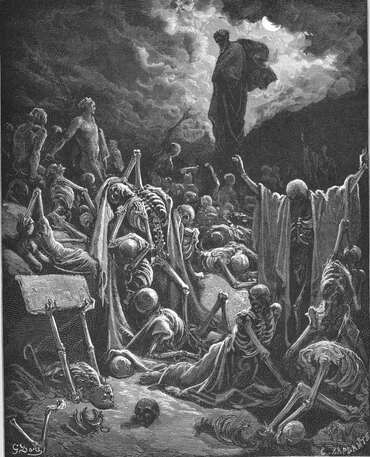True Christian Religion # 466
466. I. The fact that two trees, one of life and one of the knowledge of good and evil, were put in the Garden of Eden, means that man was given free will in spiritual matters.
Many people have believed that by Adam and Eve in the book of Moses are not meant the first human beings to be created, and in support of this view they have employed proofs that there were people before Adam, drawn from computations and chronologies preserved by some peoples. It is also supported by what Cain, Adam's firstborn, said to Jehovah:
I shall be a wanderer, driven to and fro on the earth, so that anyone meeting me will kill me. For which reason Jehovah set a mark on Cain, that anyone meeting him should not kill him, Genesis 4:14-15.
And after he went from before the face of Jehovah, he dwelt in the land of Nod, and built a city, Genesis 4:16-17.
It follows from this that the earth was inhabited before Adam.
I proved at length in the work called ARCANA CAELESTIA, which I published in London, that Adam and his wife mean the most ancient church on this earth. I also proved there that the Garden of Eden means the wisdom of the people in that church, the tree of life means the Lord being in man and man being in the Lord, and the tree of the knowledge of good and evil means man not being in the Lord but immersed in his own self (proprium), as is everyone who believes that he does everything, even good, of himself. Eating from this tree means making evil one's own.
Bones

Bones are strong and supportive, providing a framework for our bodies and making motion and action possible. They are also the least "alive" part of our bodies, with much of their structure made up of a mineral matrix. As such, they represent a strong, supportive, functional but innately nearly dead part of our spiritual makeup: the "proprium."
The proprium is the part of us that feels life as our own, that perceives our loves and our thoughts as originating within ourselves. If we simply follow the proprium without looking to the Lord, it will lead us to a hellish state, in which we believe ourselves to be all-powerful and deny the existence of the Lord altogether.
Bones, on their own, will go dry, brittle and completely dead. If, however, we acknowledge the Lord and follow him, that's like putting flesh on the bones and being alive. In that case the bones – strong, supportive, protective and as alive as they can be – represent the proprium in relation to intellect, the part of us that perceives our thoughts as our own but turns them toward the Lord.






